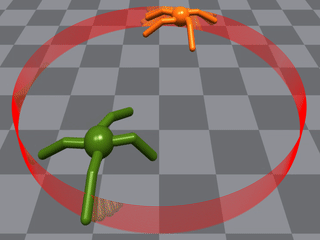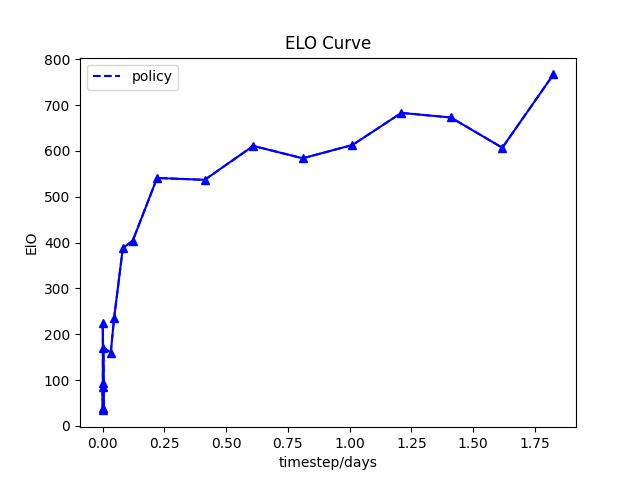TimeChamber is a large scale self-play framework running on parallel simulation. Running self-play algorithms always need lots of hardware resources, especially on 3D physically simulated environments. We provide a self-play framework that can achieve fast training and evaluation with ONLY ONE GPU. TimeChamber is developed with the following key features:
- Parallel Simulation: TimeChamber is built within Isaac Gym. Isaac Gym is a fast GPU-based simulation platform. It supports running thousands of environments in parallel on a single GPU.For example, on one NVIDIA Laptop RTX 3070Ti GPU, TimeChamber can reach 80,000+ mean FPS by running 4,096 environments in parallel.
- Parallel Evaluation: TimeChamber can fast calculate dozens of policies' ELO rating(represent their combat power). It also supports multi-player ELO calculations by multi-elo. Inspired by Vectorization techniques for fast population-based training, we leverage the vectorized models to evaluate different policy in parallel.
- Prioritized Fictitious Self-Play Benchmark: We implement a classic PPO self-play algorithm on top of rl_games, with a prioritized player pool to avoid cycles and improve the diversity of training policy.
- Competitive Multi-Agent Tasks: Inspired by OpenAI RoboSumo, we introduce two competitive multi-agent tasks(e.g.,Ant Sumo,Ant Battle) as examples. The efficiency of our self-play framework has been tested on these tasks. After days of training,our agent can discover some interesting physical skills like pulling, jumping,etc. Welcome to contribute your own environments!
Download and follow the installation instructions of Isaac Gym: https://developer.nvidia.com/isaac-gym
Ensure that Isaac Gym works on your system by running one of the examples from the python/examples
directory, like joint_monkey.py. If you have any trouble running the samples, please follow troubleshooting steps
described in the Isaac Gym Preview Release 3/4 installation instructions.
Then install this repo:
pip install -e .Source code for tasks can be found in timechamber/tasks,The detailed settings of state/action/reward are
in here.
More interesting tasks will come soon.
Ant Sumo is a 3D environment with simulated physics that allows pairs of ant agents to compete against each other. To win, the agent has to push the opponent out of the ring. Every agent has 100 hp . Each step, If the agent's body touches the ground, its hp will be reduced by 1.The agent whose hp becomes 0 will be eliminated.
Ant Battle is an expanded environment of Ant Sumo. It supports more than two agents competing against with each other. The battle ring radius will shrink, the agent going out of the ring will be eliminated.
To train your policy for tasks, for example:
# run self-play training for Ant Sumo task
python train.py task=MA_Ant_Sumo headless=True# run self-play training for Ant Battle task
python train.py task=MA_Ant_Battle headless=TrueKey arguments to the training script
follow IsaacGymEnvs Configuration and command line arguments
.
Other training arguments follow rl_games config parameters,
you can change them in timechamber/tasks/train/*.yaml. There are some specific arguments for self-play training:
num_agents: Set the number of agents for Ant Battle environment, it should be larger than 1.op_checkpoint: Set to path to the checkpoint to load initial opponent agent policy. If it's empty, opponent agent will use random policy.update_win_rate: Win_rate threshold to add the current policy to opponent's player pool.player_pool_length: The max size of player pool, following FIFO rules.games_to_check: Warm up for training, the player pool won't be updated until the current policy plays such number of games.max_update_steps: If current policy update iterations exceed that number, the current policy will be added to opponent player_pool.
To evaluate your policies, for example:
# run testing for Ant Sumo policy
python train.py task=MA_Ant_Sumo test=True headless=True checkpoint='models/ant_sumo/policy.pth'You can set the opponent agent policy using op_checkpoint. If it's empty, the opponent agent will use the same policy
as checkpoint.
We use vectorized models to accelerate the evaluation of policies. Put policies into checkpoint dir, let them compete
with each
other in parallel:
# run testing for Ant Sumo policy
python train.py task=MA_Ant_Sumo test=True headless=True checkpoint='models/ant_sumo' player_pool_type=vectorizedThere are some specific arguments for self-play evaluation, you can change them in timechamber/tasks/train/*.yaml:
games_num: Total episode number of evaluation.record_elo: SetTrueto record the ELO rating of your policies, after evaluation, you can check theelo.jpgin your checkpoint dir.
init_elo: Initial ELO rating of each policy.
You can build your own task
follow IsaacGymEnvs
, make sure the obs shape is correct andinfo contains win,loseanddraw:
import isaacgym
import timechamber
import torch
envs = timechamber.make(
seed=0,
task="MA_Ant_Sumo",
num_envs=2,
sim_device="cuda:0",
rl_device="cuda:0",
)
# the obs shape should be (num_agents*num_envs,num_obs).
# the obs of training agent is (:num_envs,num_obs)
print("Observation space is", envs.observation_space)
print("Action space is", envs.action_space)
obs = envs.reset()
for _ in range(20):
obs, reward, done, info = envs.step(
torch.rand((2 * 2,) + envs.action_space.shape, device="cuda:0")
)
# info:
# {'win': tensor([Bool, Bool])
# 'lose': tensor([Bool, Bool])
# 'draw': tensor([Bool, Bool])}If you use timechamber in your research please use the following citation:
@misc{InspirAI,
author = {Huang Ziming,Wu Yutong,Flood Sung},
title = {TimeChamber: A Massively Parallel Large Scale Self-Play Framework},
year = {2022},
publisher = {GitHub},
journal = {GitHub repository},
howpublished = {\url{https://github.com/inspirai/TimeChamber}},
}



